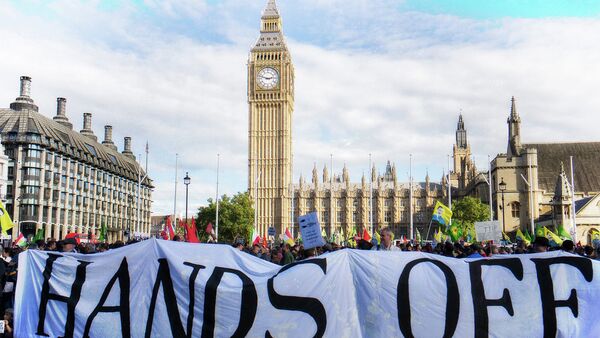David Cameron made the rather strange comment at the G20 summit in Brisbane after a meeting between EU and US leaders.
However oddly phrased Mr Cameron's comment was though it is clear that the previously stalling discussions over the Atlantic will now be accelerated to try and make TTIP a reality sooner rather than later.
The plans are a series of trade negotiations being carried out mostly in secret between the EU and US. As a bi-lateral trade agreement, TTIP is about reducing the regulatory barriers to trade for big business, for things like food safety law, environmental legislation, banking regulations and the sovereign powers of individual nations.
John Hilary, Executive Director of campaign group War on Want and fierce critic of the plans, described TTIP as: "An assault on European and US societies by transnational corporations."
Since before negotiations began last February, the process has been secretive and undemocratic. This secrecy is on-going, with nearly all information on negotiations coming from leaked documents and Freedom of Information requests.
Whilst the secrecy involved with TTIP is inherently disconcerting, critics have argued that it is the removal of regulatory barriers that British citizens should be most worried about.
Britain's social standards like labour rights and digital privacy laws could be threatened by multinational corporations as well as public services in key sectors like healthcare provision.
John Hilary, explained the situation regarding the NHS: "The threat to public health posed by agreements on trade liberalisation has been a topic of policy interest for many years.
"Much interest in TTIP has focused on the inclusion of health services in the agreement, and particularly the threat to the NHS. The European Commission has confirmed that health services are on the table, and a leaked copy of the EU's liberalisation offer has revealed its full ambition.
"Not only hospital services but medical (including midwifery and physiotherapy) and dental services are to be opened up to competition under TTIP. Individual EU member states may enter reservations to protect specific sectors, but the only one entered by the UK government is for ambulance services.
"The market liberalisation introduced by the 2012 Health and Social Care Act ensures it will be effectively impossible to take the NHS back into public hands if the EU-US deal goes through. Both the UK government and the European Commission have confirmed that TTIP's provisions to protect investors would grant US corporations the power to sue any future administration over such a move.
"Far from prioritising public health needs, TTIP has been designed to meet the interests of EU and US corporations seeking to maximise their profits when trading or investing across the Atlantic. If allowed to go ahead, it will represent the greatest transfer of power to transnational capital that we have witnessed in a generation. The fact that it is explicitly designed as a blueprint for all future trade and investment agreements across the world means it needs to be stopped."
Britain could well be speeding towards privatising the NHS permanently but education, especially at universities and colleges, is another public service that is under threat by TTIP.
Jenny Sherrard, of the University and College Union said: "The UK higher education market is already a strategic priority for some US education companies.
"We have grave concerns about the quality and value for money of for-profit education, and believe that a deregulated profit making education sector risks failing students, squandering taxpayer resource and damaging the UK's global reputation for excellence in tertiary education.
"TTIP rules on market access have the potential to undermine the capacity of UK policy makers to implement existing sanctions or introduce new regulations to promote public access.
"There is a real danger that US multinationals would use the TTIP to litigate against any attempt by an elected government to introduce tighter regulation of the private education sector. The interests of students and taxpayers would be subordinated to the potential costs of legal action by powerful US companies whose primary interest is in making profit."


